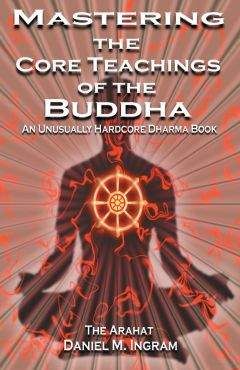Daniel Ingram - Mastering the Core Teachings of Buddha - An Unusually Hardcore Dharma Book
На электронном книжном портале my-library.info можно читать бесплатно книги онлайн без регистрации, в том числе Daniel Ingram - Mastering the Core Teachings of Buddha - An Unusually Hardcore Dharma Book. Жанр: Прочее издательство -, год 2004. В онлайн доступе вы получите полную версию книги с кратким содержанием для ознакомления, сможете читать аннотацию к книге (предисловие), увидеть рецензии тех, кто произведение уже прочитал и их экспертное мнение о прочитанном.
Кроме того, в библиотеке онлайн my-library.info вы найдете много новинок, которые заслуживают вашего внимания.

Daniel Ingram - Mastering the Core Teachings of Buddha - An Unusually Hardcore Dharma Book краткое содержание
Mastering the Core Teachings of Buddha - An Unusually Hardcore Dharma Book читать онлайн бесплатно
Practical Meditation Considerations
of all of the sensations that make it up. If our practice is not very strong, we will simply be swamped, lost in the habitual patterns of thinking associated with our “stuff.”
Thus, physical sensations help us ground ourselves, and mental sensations open us up to plunging into the depths of mental life or getting lost in it. From a pure insight point of view, neither one is more holy or more of a source of truth. However, when we do the experiment we will quickly realize what works for us; “works” in this case meaning that we can keep seeing the true nature of the numerous quick sensations that make up our reality.
There are numerous other types of physical objects that may be investigated, including sounds, sights, and even smells and tastes. Some people have a natural proclivity for investigating the sensations of a particular sense door. There is a monk in Burma that recommends his students use the high-pitched tones in our ear as an object, and sometimes I have found them very useful and interesting. Rather than seeming to be a continuous tone, we can hear each little individual sensation of ringing as a discontinuous entity. We may also take sights as object, such as the colors on the back of our eyelids or, if our eyes are open, whatever visual sensations present themselves. These are also impermanent, and if we are good at this we may even see our visual world presenting itself like the frames of a movie.
Another consideration is whether to use a narrow or broad focus of attention. The advantage of a more narrow focus of attention is that it may exclude many distractions. We may get very good at seeing certain selected types of objects, such as the sensations of breathing in the abdomen or at the tip of the nose, and this is just fine and even a very good idea. Such one pointed practice is routinely recommended, and some people, such as myself, have a natural inclination towards this style.
Others find that this makes them too tight and irritable. However, they find that they do much better with a wider and more inclusive field of attention. These things vary with the person and the situation, and if we are honest with ourselves we will be able to know what is working for us and what is not. The advantage of a wide field of attention is that we need to put less effort into staying focused and can be more present to 76
Practical Meditation Considerations
whatever arises naturally. The downside is that we may become very lazy meditators and get lost in thought. These tradeoffs must be weighed against each other.
There are practices, such as body sweeping, that keep the attention moving all the time. This can be very helpful, as it keeps us engaged with new and interesting sensations and may keep us from getting into ruts of thinking that we are staying with new sensations when really we are just remembering old patterns. However, these practices have the downside that they can sometimes lack the real precision of honest attention that comes from staying with more restricted areas of focus.
We can end up giving more attention to keeping our attention moving than to clearly investigating what our attention reveals. Again, some people do well with moving attention practices and some seem to thrive on keeping the attention in one place.
It should be noted that we may not always know exactly what is best for us. We may pick practices that feel good to us precisely because they don’t hit too closely, don’t allow us to clearly investigate the disconcerting truths of impermanence and suffering, don’t hit at our sense of identity in a way that really cuts to the bone. We might also pick traditions that are grueling and very painful for us because we imagine that this is what is important, even if such traditions do not facilitate clear investigations of the truth of our actual experience. Thus, working with good teachers who can advise us and help us keep from resting in our delusions is recommended. That said, some teachers only teach one practice, usually the particular one that worked for them. If that is also a technique that genuinely works for us, then we are set. If not, we may wish to investigate other traditions and techniques.
On a related note, I have advocated figuring out what works for you, considering how you are built and where you are. I do, however, recommend moderation in this. For instance, if you sit down to meditate and then decide that you are just a bit sleepy, so you stand up, and then you settle down a bit, so a few minutes later you sit down again. Then a minute later you decide you really don’t like that little pain in your knee and so you lie down, and so it goes. Such practice is likely to be of little benefit to you, so try to pick a posture and stick with it within reason. The same applies to objects of meditation, particularly 77
Practical Meditation Considerations
when you are starting out. There is a lot to be said for cultivating this basic level of self-control and discipline. Without it, we can end up shifting our practice habits every time our investigation begins to hit close to home.
RESOLVE
That brings me to the topic of resolve. I strongly recommend developing the freedom to choose what happens in your life that comes from discipline. While people often think of discipline as being contrary to freedom, I equate the two in many ways. Discipline and resolve allow one to make choices about what we do and stay strong in the face of difficulties. Thus, I recommend that when you set aside a period of time for a particular training, you resolve that for that period you will work on the specific training you have set out to work on, and that you will work on it whole-heartedly.
Without discipline, without formal resolve, you may easily find yourself in something resembling the following situation. You sit down on the cushion with the vague intention to do some insight practices, and begin trying to investigate, but soon you find yourself thinking about how you really should be paying your bills. Then your knee begins to hurt, so you tune into the low-level jhanic bliss that you have managed to cultivate the ability to find, and then you feel hungry, so you get up and fix yourself a sandwich. You then think to yourself, “Hey, what am I doing here eating this sandwich? Wasn’t I doing insight practice?”
You are not free. Instead, you are floundering. Without discipline, without resolve, you are unlikely to be able to get past some of the difficult hurdles that stand between you and success in any of these trainings.
I have found it extremely valuable, particularly when sitting down to do formal meditation, to state to myself at the beginning of the session exactly what I am doing, what I hope to attain by it, and why attaining that is a good idea. I do this formally and clearly, either out loud or silently to myself. Having done practice with and without them, I have come to the definite conclusion that formal resolutions can make a huge difference in my practice. One of my favorite resolutions goes something like, “I resolve that for this hour I will consistently investigate 78
Practical Meditation Considerations
the sensations that make up reality so as to attain to liberating insights for the benefit of myself and all beings.”
Resolutions such as this one add a great deal of focus and
consciousness to my practice. They galvanize my energy, make plain my intentions, and also seem to work at some more subliminal or subconscious level to help keep me on track. I have also found that I can use resolutions in my daily life to good effect. For instance, when studying for a medical school exam, I might resolve, “For this hour, I will study this hematology syllabus so that I will increase my knowledge and skill as an aspiring doctor and thus be less likely to kill patients and more likely to help them.”
Such resolutions might seem overly formal or perhaps even goofy, and they sometimes seem this way to me, but I have come to appreciate them anyway. If I make resolutions that do not ring true, I can feel it when I say them, and this helps me understand my own path and heart.
If I am lost and wondering why I am doing what I am doing, these sorts of resolutions help me to consciously reconnect with what is important in life. I suggest that you try making these sorts of resolutions in your own life, at least so that you can see if they are useful for you. I am a big fan of formal resolutions, but you should see for yourself.
TEACHERS
There are many types of teachers out there from many traditions.
Some are very ordinary and some seem to radiate spirituality from every pore. Some are nice, some are indifferent, and some may seem like sergeants in boot camp. Some stress reliance on one’s own efforts, others stress reliance on the grace of the guru. Some are very available and accessible, and some may live far away, grant few interviews, or have so many students vying for their time that you may rarely get a chance to talk with them. Some seem to embody the highest ideals of the perfected spiritual life in their every waking moment, while others may have many noticeable quirks, faults and failings. Some live by rigid moral codes, while others may push the boundaries of social
conventions and mores. Some may be very old, and some may be very young. Some may require strict commitments and obedience, while others may hardly seem to care what we do at all. Some may advocate very specific practices, stating that their way is the only way or the best 79
Practical Meditation Considerations
way, while others may draw from many traditions or be open to your doing so. Some may point out our successes, while others may dwell on our failures.
Some may stress renunciation or even ordination into a monastic order, while others seem relentlessly engaged with “the world.” Some charge a bundle for their teachings, while others give theirs freely. Some like scholarship and the lingo of meditation, while others may never use or even openly despise these formal terms and conceptual frameworks.
Some teachers may be more like friends or equals that just want to help us learn something they happened to be good at, while others may be all into the hierarchy, status and role of being a teacher. Some teachers will speak openly about attainments, and some may not. Some teachers are remarkably predictable in their manner and teaching style, while others swing wide in strange and unpredictable ways. Some may seem very tranquil and mild mannered, while others may seem outrageous or rambunctious. Some may seem extremely humble and unimposing, while others may seem particularly arrogant and presumptuous. Some are charismatic, while others may be distinctly lacking in social skills.
Some may readily give us extensive advice, and some just listen and nod. Some seem the living embodiment of love, and others may piss us off on a regular basis. Some teachers may instantly click with us, while others just leave us cold. Some teachers may be willing to teach us, and some may not.
So far as I can tell, none of these are related in any way to their meditation ability or the depths of their understanding. That is, don’t judge a meditation teacher by their cover. What is important is that their style and personality inspire us to practice well, to live the life we want to live, to find what it is we wish to find, to understand what we wish to understand. Some of us may wander for a long time before we find a good fit. Some of us will turn to books for guidance, reading and practicing without the advantages or hassles of teachers. Some of us may seem to click with a practice or teacher, try to follow it for years and yet get nowhere. Others seem to fly regardless. One of the most interesting things about reality is that we get to test it out. One way or another, we will get to see what works for us and what doesn’t, what happens when 80
Practical Meditation Considerations
we do certain practices or follow the advice of certain teachers, as well as what happens when we don’t.
Another thing about teachers is that they only know what they know.
If we use the scopes of the Three Trainings to examine this, we may find that some teachers may have a good grasp of some of these scopes and not have a good grasp of the others. In fact, mastery in any area guarantees nothing about mastery of the others. It is worth being realistic about this fact, and so I will go on and on about this later.
Also, when we interact with teachers, we may wish to also consider which of their bodies of knowledge we wish to draw on, i.e. which of the Three Trainings we want help with. In fact, I think that it is very important to be clear about this explicitly, so that when we go in to talk with a teacher, we can ask questions from the correct conceptual framework and also fit their advice back into the correct framework. If we ask a teacher about how to attain to some high state and they mention tuning into boundless joy, and we then try to do this when driving to work and crash into the rear end of the car of some poor commuter, we have not followed their advice properly.
Similarly, we may wish to explicitly ask our teachers if they are skilled in the aspect of the specific training we are interested in mastering and also to what level. While you cannot always trust them to tell the truth, either through their own self-deception or the desire to fool you, if they do say something like, “No, I don’t know enough to speak on that level, as my own abilities are not that strong yet,” then at least you know to seek advice elsewhere. I have much more respect for a teacher who once told me that he didn’t feel qualified to teach me than for the numerous teachers who were not qualified to teach me who either didn’t realize this or tried to pretend otherwise.
Also, I would recommend making your goals for your life and
practice specific. For instance, you may wish to get a job as a dishwasher so that you can continue to feed yourself. You go to the meditation teacher and say, “I want to get a job as a dishwasher. Do you know how to do this?”
They may say, “Yes.”
To which you could reply, “How do you know this?”
81
Practical Meditation Considerations
They could just as easily have said, “I have no idea, as I am a meditation teacher, not a career counselor or restaurant manager.”
The same basic conversational pattern could be repeated just as easily for the other two trainings. For instance, you could ask a meditation teacher, “I wish to learn how to get into the early concentration states. Do you know how to do this?”
You could also ask, “I wish to attain to the first stage of
enlightenment. Do you know how to do this?”
If they say, “Yes,” the next question would be, “What are the specific steps that will likely produce that result?”
This sort of straightforward approach to spirituality is extremely pragmatic and empowering. Further, it makes interactions with teachers more fruitful.
This brings me to another point: teachers can generally tell if you are serious and if you have clearly thought through what you want. For instance, it takes about two seconds of someone asking a meditation teacher for advice on their emotional stuff for the teacher to realize that this person is interested on working on conventional happiness and is not interested in learning insight practices. Similarly, it takes few conversations with a student to figure out if they are following your advice or not, so don’t try to fool them. If you don’t like their advice, better to tell them that and also why so that they can address this, either by modifying their advice or by further explaining why they feel their advice might be helpful.
Похожие книги на "Mastering the Core Teachings of Buddha - An Unusually Hardcore Dharma Book", Daniel Ingram
Daniel Ingram читать все книги автора по порядку
Daniel Ingram - все книги автора в одном месте читать по порядку полные версии на сайте онлайн библиотеки My-Library.Info.




